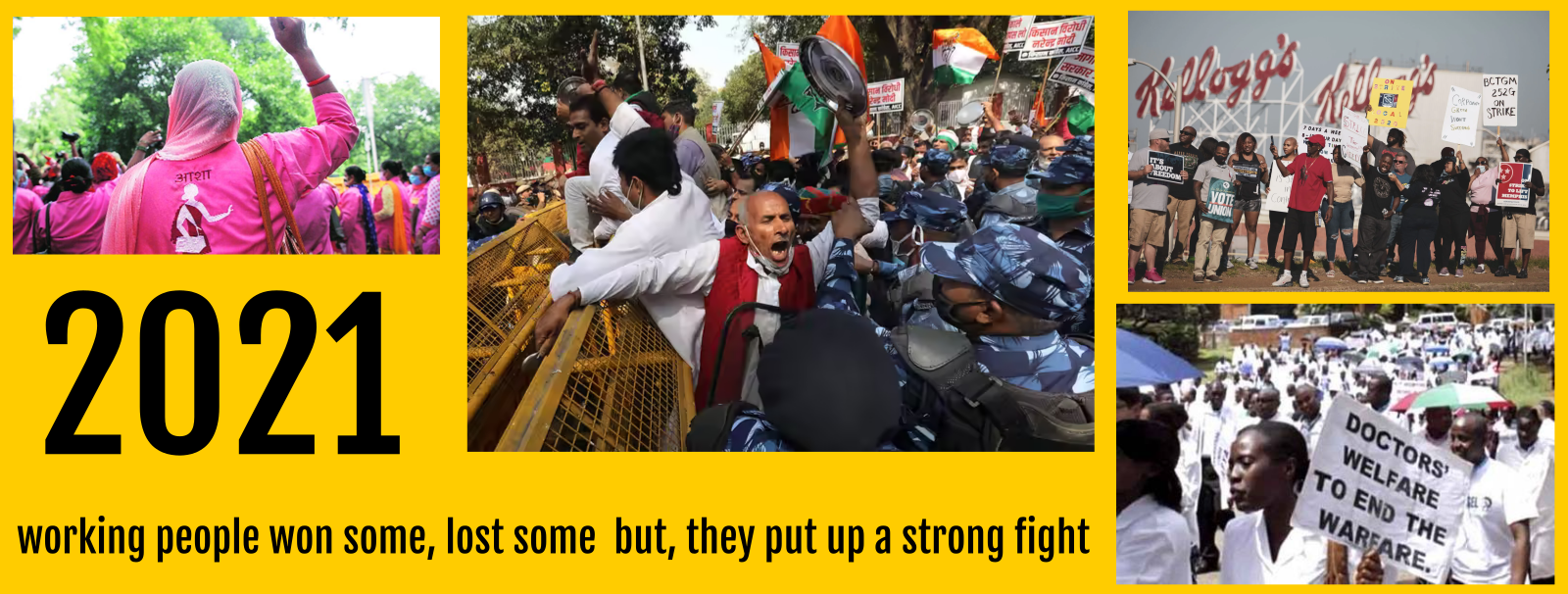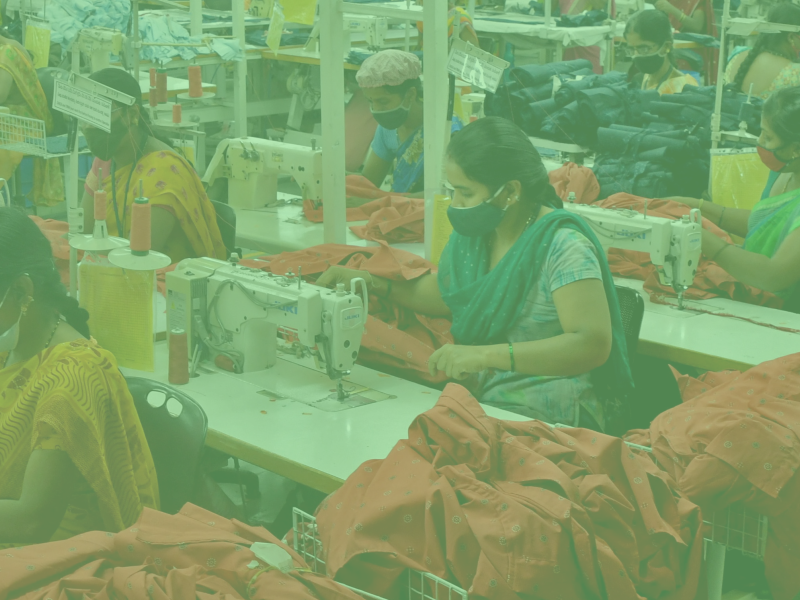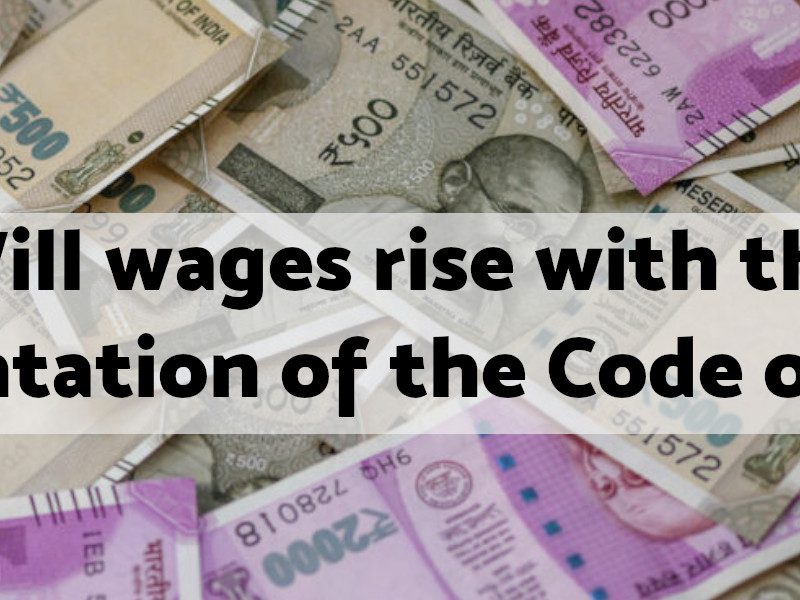The year that went by would be remembered for the resilience of working people who rose in rage against the plundering of their rights and collective resources by a handful of rich people, corporations and governments working at the behest of the rich, amid a raging pandemic. [Pfizer, BioNTech and Moderna reported profits of $65000 or Rs. 48,75,000 per minute by selling COVID-19 vaccines.]
What started as a health ‘emergency’ in early 2020 continued as a crisis in 2021 because big corporates identified profiteering opportunities even in death and distress. Governments actively promoted exploitation of people by big businesses while people were at their vulnerable worst.
The Merriam Webster dictionary defines Emergency as an unforeseen combination of circumstances or the resulting state that calls for immediate action. The COVID-19 pandemic has remained a life threatening situation for over 2 years now. There is nothing unforeseen about it and governments across the globe have taken no action to quell it.
From Essential workers to independent contractors and back

The most marginalised of the lot – contract health workers, care providers to elderly & children, delivery workers, sanitation workers, domestic workers and many others whose labour has been kept out of sight and who have been forced to become invisible in the labour market due to a complicated maze of employment relations, were heralded as ‘frontline warriors’, ‘essential workers’, ‘COVID superheroes’, etc. They were showered with flower petals, people banged utensils, lit wicks, clapped and played music for them in appreciation of their work.
However, this was quite short lived. Essential workers very soon became gig workers in media reports and their strikes caused ‘great inconvenience’ to anyone who could afford to isolate themselves from the wrath of the deadly virus in the comfort of their homes. Amazon, the largest retail chain in the world, which reported revenues of $837,330.25 per minute in 2021, forced its workers to attend to work even while they were struggling with disease and death in their family. The state of New York was forced to sue Amazon for repeated Occupation Safety and Health violations during COVID because of workers’ pressure through repeated complaints.
Closer home, in India where the entire public health system is dependent on contract health care providers, the situation went downhill from 2020. Accredited Social Health Activists (ASHA), Aanganwadi and ANM workers found themselves exposed to the brunt of the virus with no job guarantee, social protection and abysmally poor wages. Several big and small strikes were organised by joint platforms of contract health worker unions across the country, which resulted in meagre wage increases. However, their core demand of the regularisation of services and the government employee status remains to be achieved.
In Nigeria and Zimbabwe, governments imposed bans on health workers from striking, labour courts declared health workers’ strike illegal and imposed heavy fines on unions which called for protests and demonstrations.
Platform workers advanced their struggle
Workers employed by tech companies, mainly in the service industry such as logistics of food, grocery & delivery of other essential items, taxi and ride sharing services found themselves pitched against skewed algorithms and apathetic judicial system.
Platform workers’ united efforts to better their working conditions led to many flash strikes not just across our own country but in Australia, Belgium, China, France, Portugal, Spain, Thailand and USA to name a few. These efforts led to some significant victories.
The Australian government was forced to set up a committee to study the working conditions and wages of platform workers, and its findings brought to fore the appalling reality of gig work.
The Portuguese Government approved a bill mandating ride-hailing and food delivery companies to offer formal contracts – to workers hired as ‘freelancers’ or independent contractors – as employees. The bill also made it obligatory for digital platforms to be transparent about their algorithms and artificial intelligence mechanisms. The bill is pending approval in the parliament.
In Spain, the government passed new rules mandating companies using online platforms such as mobile apps for offering goods and/or services, to hire all workers with salaried employee status within 3 months. The law also lays out provisions for sharing algorithms of such software with unions.
In UK and Italy, unions had to drag these companies to the court and fight a long legal battle. The battle has yielded in favour of workers. An Italian court has ruled that algorithms of courier company Deliveroo were skewed against workers and the ranking system was discriminatory. In another case, the Data Protection Authority has fined another food delivery company Foodinho €2.6 million for discriminatory rider rating system. In UK, the Supreme Court ordered that workers were being misclassified as independent contractors, and that Uber must treat them as employees entitled to a minimum pay, paid sick leave and social security.

In India, gig workers have approached the Supreme Court through a Public Interest Litigation seeking social security as per existing laws. The Apex Court has issued notices to employers such as Uber, Ola, Swiggy and Zomato and the government at Centre.
In China, Supreme Court issued guidelines against ‘996 work’ – infamously termed so for work hours starting from 9am and lasting till 9pm for 6 days a week. The court has laid out a time frame for companies to comply with the rules or face prosecution and fines.
All that platform workers are striving for is to gain rights as per the existing laws for workers which have been earned through indefatigable struggle of working people over the years. Therefore, employers are lobbying hard with governments to change the existing legislative framework.
Attack on workers’ rights though amendments in existing labour laws
Greece, India, Indonesia, Kyrgyzstan, Malawi, UAE and Ukraine among many other countries brought significant changes in labour laws to crush workers’ Right to Freedom of Association, Collective Bargaining and legalise fixed term contracts, institutionalise hire & fire at employers’ will, and dilute provisions of health and safety at workplace.
Governments went on this rampage in the garb of pandemic induced lockdowns. In India, last year itself, the parliament had passed 4 labour codes, diluting the provisions laid under 29 existing labour laws, without any debate or discussion. Moreover, there was a continuation of the attack on workers unleashed by state governments during the first wave of COVID – increasing working hours and suspending all workers’ rights for almost 3 years – which had to be taken back by the respective state governments once their constitutional validity was challenged by the unions in the Supreme Court. These laws are facing strong opposition by workers and their organisations across the country. Workers from across the sectors have struck work demanding repeal of the 4 labour codes.
Similar changes were brought in the form of amendments to existing labour legislation in Kyrgyzstan, Greece, UAE and Ukraine, where governments have turned a deaf ear to people’s dissent against these laws.
However, there is a lesson to be learned from the resistance by working people in Indonesia, Malawi and Kyrgyzstan. Their united and prolonged protests have forced the government to reconsider labour law changes. In Malawi and Kyrgyzstan, workers’ united opposition forced their respective presidents to refuse from giving assent to the changes in the law and send it back to the parliament. In Indonesia, the government cracked down on union leaders and arrested workers in large numbers to contain protests against the omnibus labour law but the Constitutional Court stepped in, and stayed the implementation of the law and ordered the government to re-consider its decision.
The fight is far from over but these instances have made it clear that the only way to fight this onslaught is to unite our forces and take the government head on.
Be it the year-long farmers movement in India, the 9-month long nurses’ strike in the USA or the oil workers’ strike in Iran, it is only through collective action that working people have been able to better their lives.
It is this united action that employers and governments fear the most. Therefore, employers spend a lot of money in keeping workers from unionising. Anti-union propaganda and legal cases cost companies several times more than the meagre demands workers make. This makes 2 things very clear. First, companies have always had the monies to meet workers’ demands, and with increasing profits and stagnating wages more than ever. Secondly, employers know that workers’ collective power can make them kneel even in a system which is skewed in their [employers’] favour. Hence, they roll out their biggest guns at the slightest hint of collectivisation among workers.
It was no surprise then that Amazon went all out with its union busting tactics before the union vote in Alabama. Their attempts were so brazen that the National Labour Relations Board couldn’t refuse workers’ demand to take cognizance of the anti-union propaganda passed off as ‘education material’, and the threats issued to the worker leaders, and therefore call for a re-vote.
Similarly, Google has been served notices from court to produce the materials it shared with managers to identify and crush ‘union threat’ and all the material it posted to its workers to deter them from joining a union.
This pattern is common across the sectors and employers. In 2022, the Rich and their corporations will try every trick in their book to take back what workers have earned through their sweat and blood. They will spend a lot of money and energy on dividing working people across gender, ethnicity, religion and region to keep them from joining forces. There is no other way for workers and their unions than to come together and strengthen the fight for a better world.



